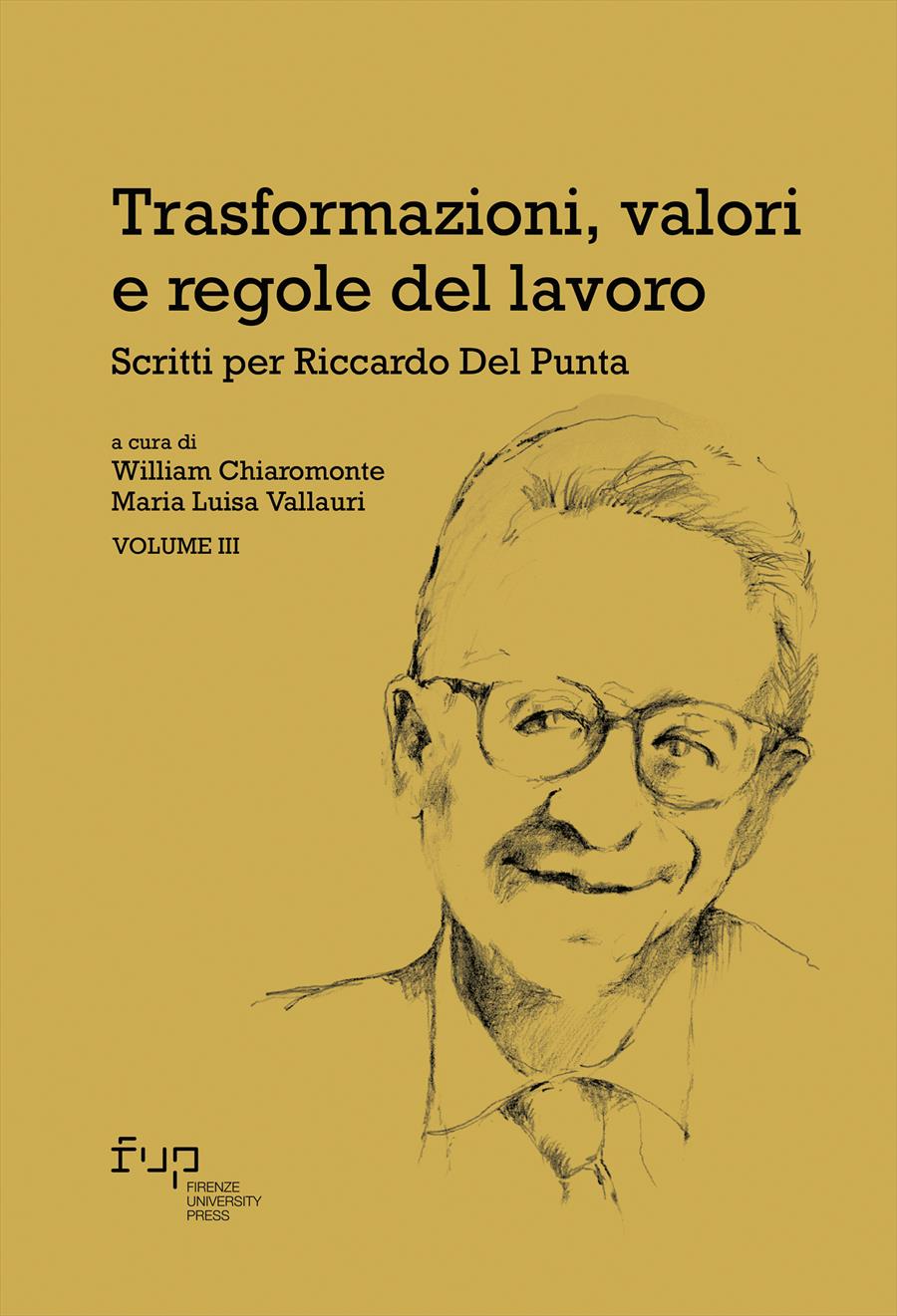- Trasformazioni, valori e regole del lavoro
- Edited by William Chiaromonte, Maria Luisa Vallauri
Il formalismo come tecnica di controllo (debole) dell’autonomia privata e alternativa (soft) all’inderogabilità
- Madia D'Onghia
- © 2024 Author(s) |
- CC BY 4.0
- DOI: 10.36253/979-12-215-0507-8.19
The essay focuses on the use of the written form in labor law (especially with reference to the genesis of the relationship), also to test the validity of formalism as a technique for protecting the worker's contractual weakness and limiting individual autonomy in the face of decline of the technique of inderogability. The A. demonstrates how over time the protective function of the formal constraint has weakened which, where prescribed, mostly serves to guarantee interests of a general nature and to satisfy the need for certainty of the rules; it is, therefore, a formalism that is entirely functional to information efficiency but certainly not to effectively guarantee the worker. Hence the importance of Riccardo Del Punta's invitation to use those regulatory techniques most functional to the defense of the values of labor law.
- Keywords:
- Formalism,
- written form,
- protective function,
- mandatory rule scherme,
University of Foggia, Italy - ORCID: 0000-0001-7388-9531
- Albanese, A. 2008. “La norma inderogabile nel diritto civile e nel diritto del lavoro tra efficienza del mercato e tutela della persona.” Rivista giuridica di diritto del lavoro e della previdenza sociale I: 169 sgg.
- Alpa, G. 1984. “La rinascita del formalismo. Aspetti di diritto contrattuale.” Rivista di diritto civile, 461 sgg.
- D’Antona, M. 1990. “Contrattazione collettiva e autonomia individuale nei rapporti di lavoro atipici.” Giornale di diritto del lavoro e delle relazioni industriali, 529 sgg.
- D’Onghia, M. 2005. La forma vincolata nel diritto del lavoro. Milano: Giuffrè.
- D’Onghia, M. 2023. “Forma del contratto di lavoro.” In Contratto di lavoro, Enciclopedia del diritto, I tematici diretto da R. Del Punta, R., Romei, F., Scarpelli, vol. VI, 643-70. Milano: Giuffrè Francis Lefebvre.
- Del Punta, R. 2002. “Il diritto del lavoro tra valori e storicità.” Lavoro e Diritto, 349 sgg.
- Del Punta, R. 2012. “Il diritto del lavoro oltre se stesso (a proposito del IV volume degli Annali).” Argomenti di diritto del lavoro, 368 sgg.
- Del Punta, R. 2022. “I valori del diritto del lavoro.” In Valori e tecniche del diritto del lavoro, a cura di R. Del Punta, 21 sgg. Firenze: Firenze University Press.
- Del Punta, R., Caruso, B. 2016. “Il diritto del lavoro e l’autonomia perduta (un commento a Luigi Mariucci).” Lavoro e Diritto, 645 sgg.
- Del Punta, R., Caruso, B., Treu, T. 2020. “Manifesto per un diritto del lavoro sostenibile.” Disponibile a: csdle.lex.unict.it.
- Di Majo, A. 1993. “La correttezza nell’attività di intermediazione mobiliare.” Banca borsa, 296 sgg.
- Ferraro, G. 1989. “Formalismo giuridico e diritto del lavoro.” Giornale di diritto del lavoro e delle relazioni industriali, 555 sgg.
- Fontana, G. 1993. “La conversione legale nei rapporti di lavoro atipico.” RIDL I: 339 sgg.
- Gabrielli, E., Orestano, A. 2000. “Contratti del consumatore.” In Digesto Discipline privatistiche, sez. civ., 225 sgg.
- Garofalo, M.G. 2003. “La legge delega sul mercato del lavoro: prime osservazioni.” Rivista giuridica di diritto del lavoro e della previdenza sociale, 359 sgg.
- Ghera, E. 2002. Diritto del lavoro. Bari: Cacucci.
- Ichino, P. 1996. Il lavoro e il mercato. Milano: Mondadori.
- Irti, N. 1997. Studi sul formalismo negoziale. Padova: Cedam.
- Mazzamuto, S. 1994. “Il problema della forma nei contratti di intermediazione mobiliare.” Contratto e Impresa, 37 sgg.
- Mazzotta, O. 1991. “Autonomia individuale e sistema del diritto del lavoro.” Giornale di diritto del lavoro e delle relazioni industriali 3: 489 sgg.
- Mazzotta, O. 2021. “Un giuslavorista allo specchio. Intervista di Vincenzo Antonio Poso a Oronzo Mazzotta.” Lavoro Diritti Europa 3: 1 sgg.
- Mazzotta, O. 2022. Diritto del lavoro. Milano: Giuffrè.
- Mengoni, L. 1990. “L’influenza del diritto del lavoro sul diritto civile.” Giornale di diritto del lavoro e delle relazioni industriali: 5 sgg.
- Osti, C. 1923. “Forma (negli atti).” In Dizionario pratico di diritto privato, III, 1, 203 sgg. Milano: Dottor Francesco Vallardi.
- Pasa, B. 2010. “Forma informativa.” In Digesto Discipline privatistiche, sez. civ., Aggiornamento, vol. V, 651 sgg.
- Pedrazzoli, M. 2023. “Profilo minimo dell’opera di Riccardo Del Punta (1957-2022).” Lavoro Diritti Europa 1.
- Rodotà, S. 1970. Le fonti di integrazione del contratto. Milano: Giuffrè.
- Schlesinger, P. 1989. “Problemi relativi alla c.d. «trasparenza bancaria».” Corriere Giuridico, 229 sgg.
- Voza, R. 2001. “Forma del contratto e trasformazione del rapporto nel part-time.” Giornale di diritto del lavoro e delle relazioni industriali, 563 sgg.
Chapter Information
Chapter Title
Il formalismo come tecnica di controllo (debole) dell’autonomia privata e alternativa (soft) all’inderogabilità
Authors
Madia D'Onghia
Language
Italian
DOI
10.36253/979-12-215-0507-8.19
Peer Reviewed
Publication Year
2024
Copyright Information
© 2024 Author(s)
Content License
Metadata License
Bibliographic Information
Book Title
Trasformazioni, valori e regole del lavoro
Book Subtitle
Scritti per Riccardo Del Punta - Volume III
Editors
William Chiaromonte, Maria Luisa Vallauri
Peer Reviewed
Number of Pages
1276
Publication Year
2024
Copyright Information
© 2024 Author(s)
Content License
Metadata License
Publisher Name
Firenze University Press
DOI
10.36253/979-12-215-0507-8
ISBN Print
979-12-215-0506-1
eISBN (pdf)
979-12-215-0507-8
eISBN (epub)
979-12-215-0508-5
Series Title
Studi e saggi
Series ISSN
2704-6478
Series E-ISSN
2704-5919
